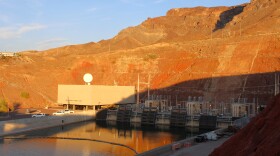Alex Hager
[Copyright 2024 KUNC]
-
Drought and steady demand along the Colorado River are draining the nation's second-largest reservoir. Land that was once submerged is now full of beavers and thriving ecosystems.
-
Ted Cooke had been tapped to run the Bureau of Reclamation, but withdrew as some Upper Basin states worried about potential bias.
-
New data from the Bureau of Reclamation puts the river and its reservoirs in formal shortage conditions. Policymakers are stuck on ways to fix that in the years to come.
-
Colorado River states appear to be coalescing around the early makings of a new plan to share water in a way that accounts for climate change.
-
Northern Colorado saw some of the state's biggest protests Saturday, but even smaller communities drew crowds.
-
Water experts gathered at the University of Colorado, Boulder for talks about the future of the Colorado River. Top policymakers were notably absent.
-
Drought conditions in the Rocky Mountains could further lower water levels at Lake Powell.
-
Springtime is here and baseball is back. This year, that’s good news for sports fans AND lovers of a threatened fish native to the Colorado River. As Alex Hager reports for the Mountain West News Bureau, one minor league team will take the field as the “humpback chubs” every Wednesday this season.
-
Water experts say cloud seeding deserves more funding and research to measure its impact on the drought-stricken Colorado River basin.
-
The Colorado River is shrinking, and leaders from the states that use it are on the hook to come up with a new plan for managing its water. They have to submit that plan to the federal government by 2026, when the current rules for sharing water expire. KUNC’s Alex Hager reports… those state leaders DO NOT think former president Donald Trump’s return to the White House will change their strategy.











